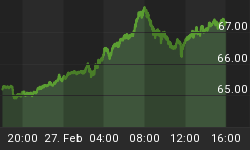The dollar has some major problems, not the least of which is that it has nowhere left to go.
Of course, there's nothing new about that but, lately, everybody seems to have forgotten the fact.
Since the very first trading day in January of this year, the dollar has recovered quite a bit of its lost ground so that, with people's short term memory being what it is these days, they simply forgot about the humongous and growing trade deficit and about foreign central banks' continuing rumblings of diversification - at least for a while.
For some as yet unexplained reason, the dollar has chosen January 2nd of 2005 to commence its year-long dead cat bounce.
Ordinarily, dead cats don't bounce that far and that long. Since they usually lose their 'bounciness' along with their vital signs, dead cats can only achieve such a prolonged trajectory if somebody picks them up and throws them a ways.
That is what seems to have happened to the buck this year.
Uncle Al's federal funds rate hikes didn't seem to "take" at all for about six months, almost. No matter what he did, the dollar just kept on dropping through the election season, all the way past Christmas to the morning after New Year's. The currency trader clique generally agrees that it was those very rate hikes that made it bounce, but why they took effect exactly when the new year rang in, nobody knows.
However that may be, the rate hikes obviously helped. But that was then. What about now?
It seems a bit iffy at this moment whether Greenie will keep his hiking boots on for very long after Katrina, and traders are going back and forth on it until new data come out. The latest data (an increase in unit labor costs and low pre-Katrina unemployment) seem to suggest that he will, but the jury is still out on that.
However, we are now getting very near Sir Alan's elusive "neutral" rate, which most believe to be somewhere around four percent.
Until then, because the rate came from so far behind, rate increases were dollar-supportive because they at first inverted, and then increased, the rate differential between the dollar and the euro.
In mid 2004, the euro's repo rate was at 2.00% and the dollar's at 1.00%. Then Greenie started on his hiking trail in June last year and pulled even with the euro's rate in November.
Since then, it has risen, virtually without interruption. So now we are at 3.50% and it's expected to go to 4.00% before the year is out.
What happens then?
Nobody knows for sure just where that "neutral" rate really is, but it's safe to assume that it lies somewhere near the four percent level. If the rate goes much higher than that, continued hikes will no longer be seen as primarily "dollar supportive." Instead, they will be seen as mildly recessionary - at first.
It's probably a safe bet to assume inflation is being underreported, but officially it currently stands at slightly higher than three percent. That's just about where we are with the federal funds rate right now, which means we are now at or near an effective zero-percent federal funds rate.
In such a climate it's easy to see why, so far, news of "inflation upcreep" was dollar supportive - because it kept the Fed raising rates.
But, from now on, we'll be in positive real rate territory. Any news that the economy remains "strong" and news of higher labor costs, lower unemployment, and high consumption will mean continued hikes from here on out.
Higher real rates mean lower profit margins for companies as their borrowing costs increase. That drags on the Dow and on the economy - and that will soon become dollar negative.
So, as he keeps hiking, Greenie may be getting a bit to close to the sun. He may get burned. (Well, maybe not him. He'll likely make his exit before these things hit home.)
But if he doesn't keep his boots strapped on, he (or whoever at the Fed) may be due for a cold shower. Any rate pause along his hiking trail for more than just a single FOMC meeting will surely do the dollar in.
In order to make a really convincing move, the buck needs to levitate itself above its index' 90 point level. Since March 2004, the dollar has bumped its head against that iron ceiling exactly six times - without any success. And now, it sits below 88 points.

However many rate hikes are left before the FFR hits its "neutral" level, those could conceivably get it back up to the 90 point ceiling - but it's highly doubtful that such will convincingly propel the dollar through that level, especially with oil prices being what they are. Predicting that oil will go back down to the thirties, as Forbes did recently, is kind of a long shot it seems.
Two Choices - Equally Bad
The bottom line is this: Either Greenspan or his successor have exactly two choices: Keep on hiking and drag the Dow back into the valley of death (with the dollar and the entire US economy soon to follow) - or stop hiking and make the dollar lose its footing completely.
Take your pick.
The consequences for gold, either way, should be obvious. The only thing it takes is just a little more patience.
Got gold?















